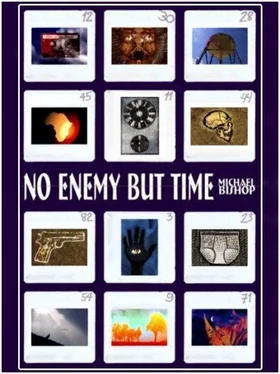Later that day I cut my beetle loose and tossed it out into the savannah. If it were industrious, it would survive. Those who derive their sustenance from others’ shit rarely perish. Ecologically speaking, they are the universe’s chosen creatures—there is generally available so much of what they need to perpetuate their lifestyles.
New York City, The Bronx
April 1979
Heawoke to the faint, uncertain cadences of a child’s voice—his own voice, as he had sounded at ten or eleven.
“… a set of eyes,” he heard his younger self saying. “ All I am is a set of eyes, and the people I ’ m watching—they’re almost like people, but different, too—they can’t see me. They ’ re very hairy, but naked just under their hair. The women-ones have…”
In the three years since Hugo’s death Johnny had not wholly accustomed himself to waking up in his mother’s eighth-floor apartment in a building overlooking the Hudson River. This building reminded him of a huge tombstone riddled with termite cells. One morning he had cracked the Venetian blinds and caught sight of a bloated human corpse bobbing along in the river. It was worse waking in the apartment at night.
Especially if he had been dreaming of giraffes and gazelles, habilines and prototypical hartebeest. Then it hurt to realize that the beaches of Florida did not lie just beyond the wall—not beaches nor Kansas wheatfields nor the desolate prairies of Wyoming. Nothing familiar to give reality ballast. Of course, he had never been able to hang on to Pleistocene East Africa, but lately his return from each spirit-traveling episode had begun to seem like abandonment on the doorstep of an infernal orphanage. The apartment’s heating vents hissed a herpetologist’s white noise, and the sounds of sirens in the streets soared above every other noise like coloratura advertisements for the current opera season. In Johnny’s imagination, respectable Riverdale was a landscape more saurian than urban.
“… eating meat out of their hands. I don’t know what kind of meat because they were already eating it when I began to watch. Baby-ones, and ones older than babies, children I guess, try to make the men-ones pay attention to them. They want…”
What was going on? Clad only in his Fruit of the Loom briefs, Johnny threw back the covers, put his bare feet on the floor, and cocked his head. He was listening to a portion of his recorded dream diary, the chronicle of his spirit-traveling. This was a segment he had recorded not long after forsaking the complex symbology of his notebooks for the convenience of oral transcription. Since his tenth birthday, when he received the portable recorder, he had logged every one of his spirit-traveling episodes on tape.
The cassettes, nearly a dozen, he kept filed in a shoebox, the way some kids stored their baseball cards.
It was 2:27 in the morning. His watch, another gift from Hugo, gave him this reading digitally.
He turned on the tensor lamp hooked over his headboard and padded silently to the closet. He found the shoebox, one hiking boot and a pair of tennis shoes nearly concealing it, and in the box, as neatly aligned as if by the Dewey Decimal System, eleven cassettes. The symbols with which he had cryptically decorated each little talking book told him that these were the originals, not clever substitutions meant to throw him off the track.
“… with their arms around them. Some of them pass meat to the children when the men-ones gave it to them to do that. There are, well, families, sort of. They eat together, but usually…”
His own childish voice was inexpertly recapitulating one of his spirit-travels, a particularly vivid one, but the cassette on which he had chronicled this dream reposed under his hand in its usual place, undisturbed.
He set the box back on the closet floor and reeled out of his room toward the sound of his own prepubescent voice. At the entrance to Jeannette’s bedroom-study he halted and stared at his mother.
Because she was sitting at her tilted desktop, a kind of drafting board, making notations in ink on a long sheet of type-covered paper, she did not see her son come up behind her.
Galley proofs you called the kinds of pages on which she was working. You got them when a manuscript you had submitted to a publisher was just about to become an honest-to-God book. This, then, was a project that Jeannette had almost brought to completion. For the last three or four months, however, she had been complaining about how badly her work was going.
On a shelf above the drafting board hummed a portable tape player much like the one Hugo had given John-John. Jeannette suddenly punched a key, rewound the machine, and punched a second key to activate her son’s youthful voice again.
“… give it to them to do that. There are, well, families, sort of. They eat together, but usually the babies, the children, move around to get what they can from whoever’s handing it out. Later…”
“What are you doing?” Johnny interrupted John-John’s voice, his sixteen-year-old tenor overriding his ten-year-old boy soprano.
Jeannette started, gasped, dropped her ballpoint pen. She was wearing a white dressing gown embroidered about the collar and hem with an Egyptian motif (King Tut’s treasure had come through town during the nation’s Bicentennial celebration, inflicting jackal hieroglyphs and golden cobra rings on the devotees of haute couture), and her hair was clasped at her nape in a way that made her look like a girl. Recovering slightly, she gave a mighty sigh and stabbed the cassette recorder to a standstill.
“What are you doing?” Johnny demanded again.
“Having the huckleberries scared out of me. What are you doing, Master Monegal?”
“You’ve taken my tapes out of their shoebox and copied them, haven’t you? You’ve made your own cassettes. Why?”
Instead of answering, Jeannette shuffled the long galley sheets together. Johnny glided across the room and took them from her hands.
EDEN IN HIS DREAMS
The Past Through Oneiromancy, A True Story
Jeannette R. Monegal
A VIREO PRESS BOOK * * New York
This book was about him, and Jeannette had neither informed nor consulted him. She had put his skin on a typewriter platen, rolled it into place, and, if he knew anything about her literary inclinations, banged out one of those “inspirational” tomes that lay waste subject and author alike. The lares of candor and the penates of depth analysis were the tutelary deities of such writers, and Jeannette had sacrificed him to these gods.
Angrily riffling the galley proofs, Johnny picked out words like allopatric, endocranial, speciation, and collective unconscious . His own name was on nearly every page, with passing or extended references to Seville, Spain; Van Luna, Kansas; Cheyenne, Wyoming; Fort Walton Beach, Florida; and New York City. At last he let the pages go and watched them sideslip to the carpet in a random scatter.
“It’s scheduled to appear this fall, isn’t it?”
“I was going to tell you.”
“When?”
“As soon as everything was set. I’d intended it as a surprise, a tribute to what you’ve suffered, John-John.”
“Oh, I’m surprised. Yes, ma’am, one thing I am is surprised. God damn! am I surprised.”
“Johnny—”
“I was going to see it when it came out. I’d be strolling along Sixth Avenue past the goddamn Vireo Press bookstore, and pow!— like a karate chop to the windpipe—I’d see Eden in His Dreams by my very own mamma. That’s when I was going to see it, that would’ve been the surprise. Lord, Mamma, I feel like throwing you out the window without even opening it. How’d that be for a surprise?”
Читать дальше



![Ally Carter - [Gallagher Girls 01] I'd Tell You I Love You But Then I'd Have to Kill You](/books/262179/ally-carter-gallagher-girls-01-i-d-tell-you-i-lo-thumb.webp)








